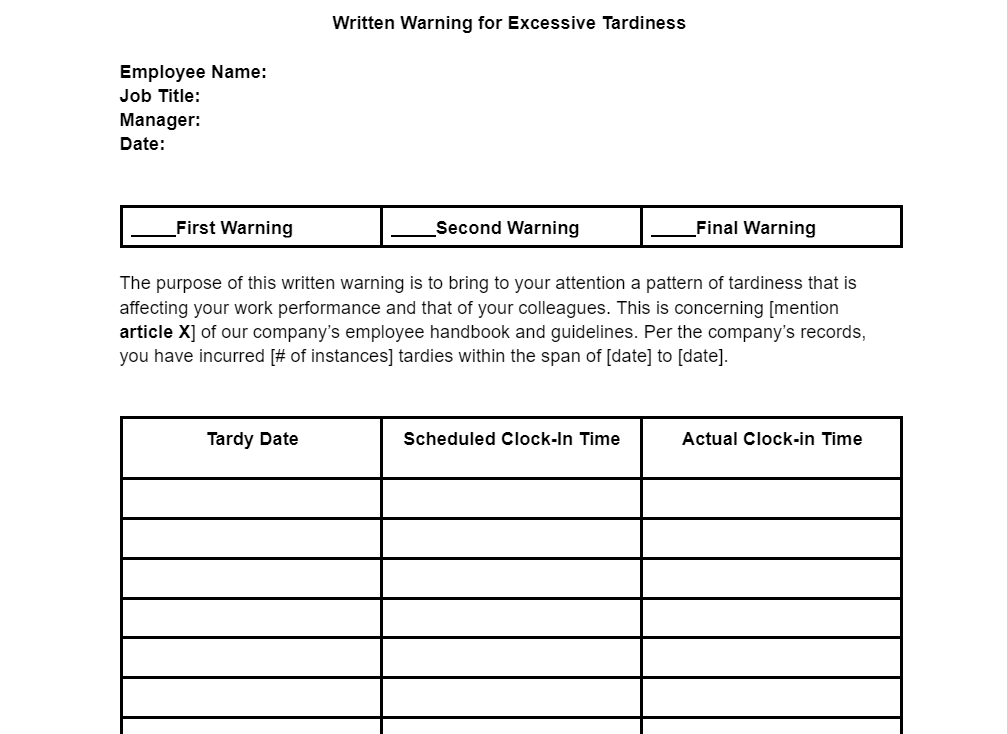How you manage an employee’s excessive tardiness can affect much more than just the employee in question. Allowing tardiness in the workplace to continue without action may increase turnover and decrease business efficiency and morale. Some simple solutions to target excessive tardiness at work include implementing time tracking, keeping thorough attendance records, and communicating a clear policy to your employees.
Your team should also be made to understand that habitual lateness has consequences, and even innocent or infrequent hiccups can affect other employees and the business’s bottom line. We’ve provided a free warning letter template that can be modified and used for employees who need to be disciplined for excessive tardiness.
Solutions to Tardiness in the Workplace
With all the negative consequences of employee tardiness—for the employee in question, their colleagues, and your business—it’s vital that you properly manage and prevent this behavior. Here are some solutions to tardiness in the workplace, whether you have an in-person or remote work environment.
How to Address Tardiness at Work
When addressing tardiness in the workplace, you can’t simply tell a worker there’s a problem without offering support to correct it. Not only is this the right thing to do, but it also helps keep your business compliant.
Communicate & Keep It Private
While other employees must know tardiness is not taken lightly, you don’t want to reprimand an employee in a public setting. Any HR discussion like this should occur in private and remain confidential.
You want to make clear that a violation of your company policy is not appropriate. Make sure, however, that you don’t come off too harshly—your employee may be dealing with personal issues you don’t know about. It’s best to begin by simply asking questions from a place of genuine curiosity. Employees will be able to tell if you’re looking to help or for a reason to discipline them.
While we recommend asking questions and being supportive, you want to be careful about violating any employment laws. As it relates to an employee’s recent tardiness, you can ask if there’s a situation that might be causing them to show up late and affecting their ability to do their job but don’t ask them specifically if they have a medical condition that’s to blame. It’s best to ask open-ended questions and get the employee to talk.
For reference, here are some questions you want to avoid:
- Are you pregnant?
- What medical issues do you have?
- Can I see your recent medical diagnosis?
- Are you taking prescriptions that make you drowsy?
Consider Employee Burnout
Addressing the employee with the right approach may depend on what causes the tardiness. If it’s burnout, then discipline alone won’t help. That may just make the employee more disengaged and late more often.
Burnout, an officially recognized medical diagnosis by the World Health Organization (WHO), can happen to any employee. According to a Work in America survey, 77% of employees experienced work-related stress in the last month.
To effectively address tardiness with a burned-out employee, you need to support them and help them figure out the root cause of their burnout. Not that you should avoid punishment for patterns of tardiness—it just shouldn’t be the only thing you do to correct the behavior.
Define the Corrective Actions
Solving employee tardiness is more than just giving your employees a written warning. It is important to discuss ways you can help your employees and define corrective actions, including providing reasonable timelines and support. This might look like:
Corrective Action | Timeline | Consequences for Failure to Complete |
|---|---|---|
Reduce tardiness by 50% | 30 days | Final written warning |
Communicate with manager before tardiness occurs | Ongoing | Progressive discipline |
No more than five late arrivals | 60 days | Final written warning |
Corrective action provides your employees with clear communication about what’s expected of them and how they can improve their behavior. By setting out the consequences for failure to meet your expectations, you make it clear what may come next for the employee, leaving no surprises for anyone.
Regardless of the outcome, document everything. If tardiness has been a problem with this employee, make sure that you document the specific dates and times the employee was late, as well as the corrective measures that you both agreed upon. Also, make sure you note a date to review their progress.
Review the Employee’s Progress
You should follow up with the employee at the 30-day and 60-day mark (as indicated on the corrective action plan) to review data. If they have reduced the frequency of their tardiness, recognize their improved behavior.
However, if the employee has not improved their behavior, it’s time to take the next step in your progressive discipline procedure. That may be a final warning or termination if this has been an ongoing pattern. If it’s the latter, make sure you have documented everything appropriately. Terminating an employee, especially one who may have a medical reason for showing up late, should be taken with great care and should involve a consultation with an employment attorney.
Learn more about employee management and how you can provide your team with the tools necessary to help them achieve their goals and stay on track.
Why Employee Tardiness Needs to be Addressed
Addressing employee tardiness is required to prevent further abuse. Regular communication and check-ins are key to making sure that your employees understand the expectations. Conversations with late employees can also help you uncover any struggles your team may have in their personal lives that are contributing to their tardiness.
If you do not address employee tardiness it can harm your business. For example:
Team Morale May Falter
Employees notice what other employees do. And that’s one of the biggest concerns with employee tardiness—the perception by other employees of favoritism or an unenforced policy. Either way, team morale can falter when even just one employee has a pattern of tardiness that goes unaddressed by management.
Example: If an office of 22 employees opens at 9 a.m., and Amanda arrives consistently between 9:10 and 9:30, then other employees will notice, and one of two situations will result:
- Other employees will start showing up late just like Amanda.
- Other employees will become frustrated that Amanda gets away with being late and not care as much about the work they do.
In either situation, you have a problem on your hands that needs to be addressed. Ignoring this issue will not make it go away and may result in additional lost productivity and potentially higher turnover.
Business Efficiency May Lower
Related to team morale is a drop in productivity, as employees who are unhappy or disengaged are less productive. A dissatisfied, unhappy, and disengaged employee is more likely to grow bad habits, like showing up late.
Tardiness can reduce your company’s efficiency and, ultimately, your bottom line, in two ways:
- When one employee consistently shows up late but you do nothing to correct the behavior, other employees become frustrated and their work may suffer.
- Those other employees have now become disengaged and may develop bad habits of their own, such as tardiness.
May Be Considered Discrimination
Avoiding disciplining a tardy employee could rise to the level of employee discrimination. If you penalize some employees for being late and not others, it might violate anti-discrimination laws.
Title VII of the Civil Rights Act of 1964 prohibits employers from discriminating against employees based on race, color, religion, sex, and national origin. Even if you do this unintentionally, it’s still against the law and could result in employee lawsuits and fines from the U.S. Department of Labor (DOL) and the Equal Employment Opportunity Commission (EEOC).
For helpful tips, check out our guide on managing employee attendance.
Frequently Asked Questions (FAQs)
Any tardiness that affects your business is an issue. However, it becomes excessive when it is habitual. An employee who is late for work three or more times a month consistently would fall under the category of excessive tardiness.
Being fashionably late only works for parties. When it comes to the workplace, typically anything under five minutes late could be considered acceptable. However, be sure your policy clearly states the rules for lateness.
Some common causes of excessive tardiness include inattentiveness (not paying attention to what time it is), impulsivity (could include making non-scheduled stops on the way to work), and anxiety (unable to get ready in time).
Bottom Line
Addressing employee tardiness can be uncomfortable, but it doesn’t have to be challenging. Speaking with employees the moment their late arrivals become an issue can prevent other employees from disengaging and avert the company from developing a culture of inefficiency. Without a quick response to tardiness, you risk losing revenue and quality employees. Taking swift action keeps everyone happy, productive, and profitable.


